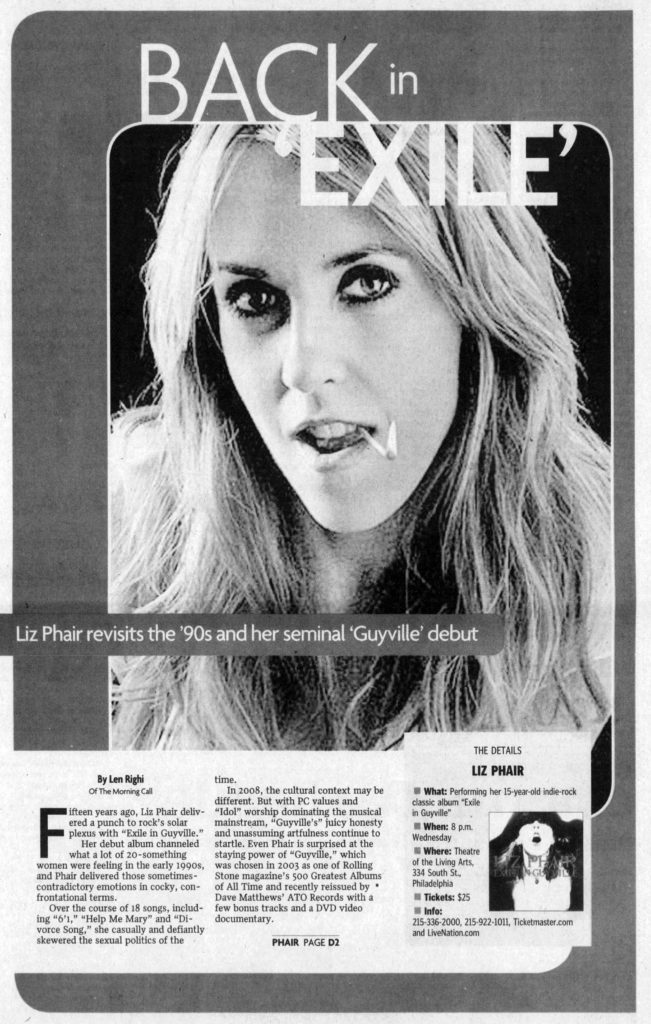By Len Righi
The Morning Call, August 23, 2008
Fifteen years ago, Liz Phair delivered a punch to rock’s solar plexus with Exile in Guyville.
Her debut album channeled what a lot of 20-something women were feeling in the early 1990s, and Phair delivered those sometimes-contradictory emotions in cocky, confrontational terms.
Over the course of 18 songs, including “6’1″,” “Help Me Mary” and “Divorce Song”, she casually and defiantly skewered the sexual politics of the time.
In 2008, the cultural context may be different. But with PC values and “Idol” worship dominating the musical mainstream, Guyville‘s juicy honesty and unassuming artfulness continue to startle. Even Phair is surprised at the staying power of Guyville, which was chosen in 2003 as one of Rolling Stone magazine’s 500 Greatest Albums of All Time and recently reissued by Dave Matthews’ ATO Records with a few bonus tracks and a DVD video documentary.
“Re-listening to it, I feel embarrassed at the memories brought up,” says Phair from the kitchen of her Los Angeles home between recording sessions for her new album and preparing for three August shows where she will perform Guyville in its entirety. (One of them will be Wednesday night at Philadelphia’s Theatre of the Living Arts.)
“What I think of when I hear it is my life then, how I struggled and fought to have pride in myself as a human being. It’s hard for me to listen to because it’s a portrait of the life I was living. I wasn’t such a nice person. I was in a lot of pain. The weight of it begins to add up.
“But,” Phair adds with characteristic humor, “if you’re not me, it’s pretty rockin’ and empowering. It makes me feel powerful now. I can see why other women felt that way. It would give them a best friend to listen to.”
For many years Phair, who was born in New Haven, Conn., and raised in the Chicago suburb of Winnetka, didn’t quite understand the ardor fans felt for Guyville, or the unhappiness with her subsequent, more mainstream pop-rock albums. “Then I had an epiphany,” she says. “When [fans] heard me playing the songs, it brought back special memories of their own lives. I realized they were not there to see me, but to remember. That’s great. I still get a little nervous and feel a little inadequate at times. But I finally got it.”
Does Phair, who is now 41 and the mother of an 11-year-old son, have any qualms about singing Guyville‘s rawer, sexually explicit tracks?
“Over the years I’ve always played some of Guyville live,” she replies, “and I’m always happy that my parents aren’t there. And when I see children in the audience, that knocks me out. Sometimes I don’t know what to do.”
“I come from a visual arts background” — she studied art at Oberlin College in Ohio — “so I know that sometimes [being] shocking can make people talk about and rethink stuff. If you rattle them, it opens up space for the new. But there’s humor in the songs, and if you don’t get that, you’re missing the boat at some level.”
Still, laying bare her hopes and desires gave her pause while she was recording Guyville. “Some nights I’d wake up in a cold sweat,” she says. “I would think, ‘I’ve brought stalkers to my doorstep! What have I done?'”
While preparing to play Guyville live, Phair said she “sort of fell in love with the back end of the record.”
“Before, when I would listen I would feel uncomfortable and turn it off after ‘Girls, Girls, Girls’ [the disc’s 11th track]. Then I realized, ‘That’s some kick-ass rock back there! Why don’t I ever get there?’ It feels sad for the pain I was in, but it made me proud.”
Phair now splits her time among Los Angeles, Chicago and New York. “I’ve been living in L.A. for nine years, but I’m still 100 percent Chicago, I have to tell you. I went back there this summer to introduce my new boyfriend and it was madness.”
She is in the final stages of recording her sixth CD, the first since Somebody’s Miracle in 2005. Phair is philosophical about what the reaction might be to the 10-song disc, perhaps because both fans and critics often have said that nothing she has done since Guyville measures up to her debut (although 1994’s Whip-Smart and 1995’s whitechocolatespaceegg certainly weren’t far off).
A favorite brickbat hurled Phair’s way stems from her working on her 2003 self-titled CD with the Matrix, the songwriting team behind Avril Lavigne’s Complicated CD. Now she is often belittled as “Avril’s mom”.
“Hey, even Rod Stewart got old,” says Phair with a laugh when asked about her disparagers. “What if someone were yelling at you that your jowls were, uh, jowly? ‘Why don’t you exercise?!!’ There’s only so much you can do.”
As for the state of male-female relationships, she says, “It’s a compromised landscape emotionally, even for me. But it’s greatly improved. The almighty dollar is the final word. As more women earn money or stay at home and do things they are passionate about, they gain independence. Things change over time, but it takes a long time. It’s akin to race relations: You never know how many prejudices are at work beneath the surface.”







